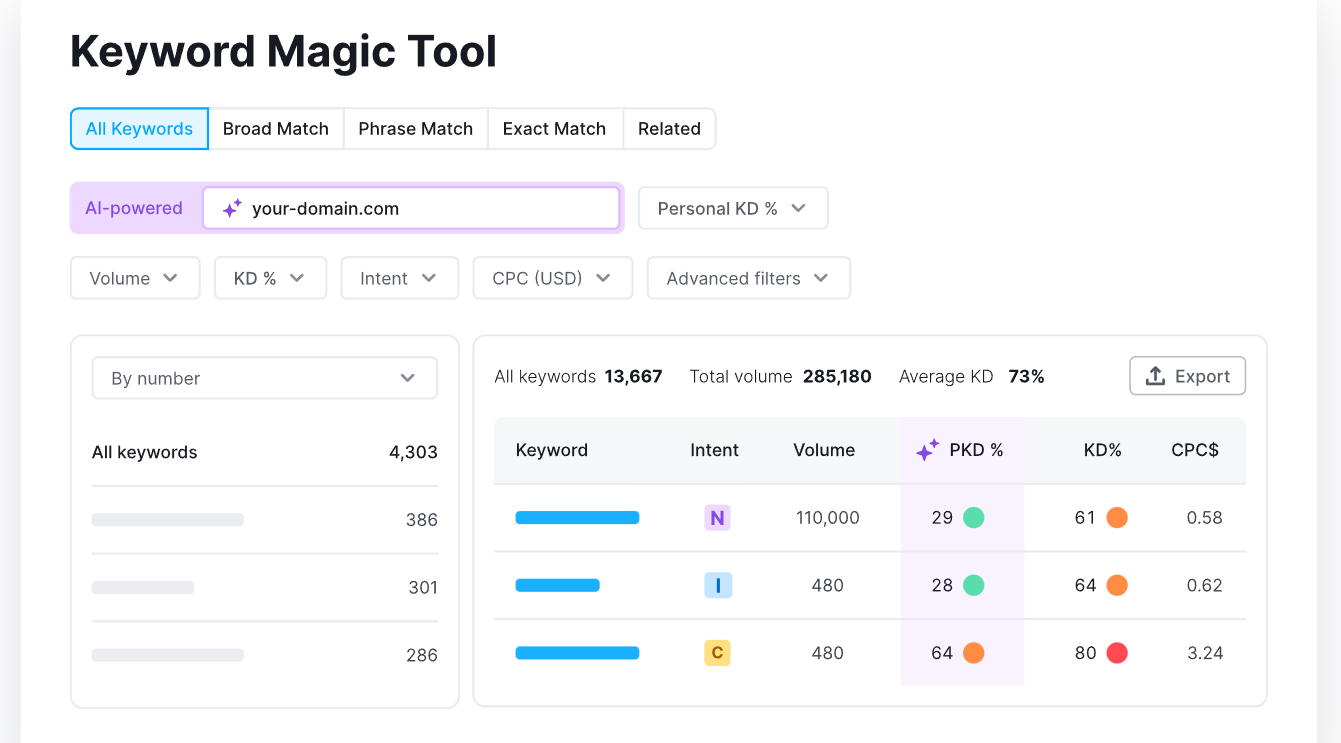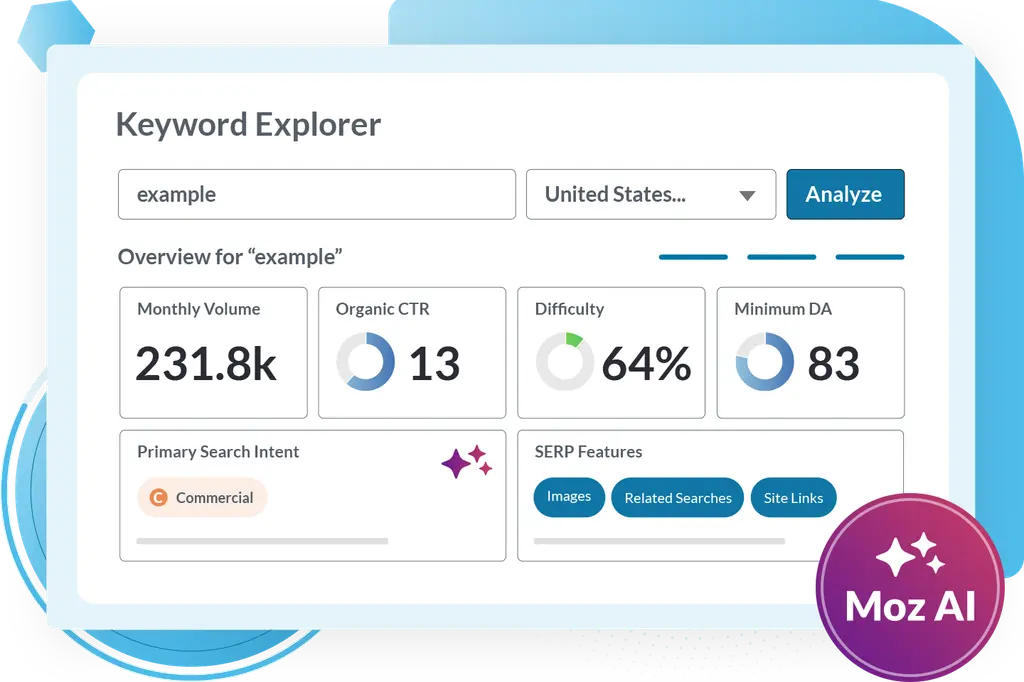Keyword research is the foundation of SEO, whether you’re building a blog, launching a product, or planning a content strategy. One of the simplest tools that gained popularity for basic keyword generation was Keyword Shitter. Its name was quirky, and its function was simple—dump thousands of long-tail keyword suggestions based on your input.
But in 2025, SEOs and content marketers need more than just endless keyword lists. They require context: search volume, keyword difficulty, user intent, and integration with content strategy. That’s where Keyword Shitter alternatives come into play.
Best Keyword Shitter Alternatives
1. SEMrush Keyword Magic Tool

SEMrush is a powerhouse for deep keyword research. It gives access to an enormous database of keywords filtered by search intent, question format, SERP features, and match type. Beyond just generating ideas, it helps users identify gaps, evaluate competition, and organize keyword strategies. Best for digital marketing professionals and SEO agencies managing large content and ad campaigns.
Pros
- Massive keyword database with extensive filtering
- Clear breakdown by user intent (informational, transactional, etc.)
- Integrates seamlessly with other SEMrush SEO and PPC tools
Cons
- Higher cost, better suited for professionals and agencies
- Slight learning curve for beginners
2. Moz Keyword Explorer

Moz Keyword Explorer is a robust keyword research tool that blends simplicity with strategic depth. It offers keyword suggestions, search volume, organic click-through rate (CTR), keyword difficulty, and a unique “Priority Score” that combines all metrics to help users focus on the most valuable keywords. This tool is perfect for bloggers, SEO professionals, and marketing teams looking for intuitive, data-driven keyword planning without getting overwhelmed.
Pros
- Prioritizes keywords using a smart all-in-one score
- Easy-to-use interface ideal for beginners and pros alike
- Includes organic CTR and SERP analysis for content relevance
Cons
- Smaller keyword database compared to competitors like Ahrefs
- Limited free usage without a premium plan
3. Keyword Tool
Keyword Tool is a freemium keyword research tool designed for generating long-tail keyword suggestions based on Google Autocomplete. It supports data collection from several platforms, including YouTube, Bing, Amazon, eBay, and App Store. It’s particularly helpful for marketers who are conducting SEO across multiple channels. The interface is cleaner and more intuitive than Keyword Shitter and enables users to generate keyword ideas in multiple languages. It’s particularly well-suited for content creators, digital marketers, and PPC advertisers looking to generate keyword ideas without needing extensive SEO experience.
Pros
- Pulls suggestions from various platforms beyond Google
- Supports multiple languages
- Simple, clean, and user-friendly interface
Cons
- Volume and CPC data are locked behind the paid plan
- Doesn’t include SERP analysis or keyword difficulty scores
4. Ubersuggest
Ubersuggest, developed by Neil Patel, is an all-in-one keyword research and SEO tool. It helps you find keyword suggestions along with valuable metrics like search volume, SEO difficulty, paid difficulty, and CPC. Beyond keyword research, it also provides backlink data, content ideas, domain overview, and site audit features. Ubersuggest is particularly great for freelancers, bloggers, and small businesses who need a powerful SEO tool without the hefty price tag of enterprise tools.
Pros
- Complete keyword analysis with search volume and competition
- Built-in content and backlink suggestions
- Easy to navigate and understand for beginners
Cons
- Free plan has strict daily limits
- Data depth may not match that of premium enterprise tools
5. AnswerThePublic
AnswerThePublic transforms search data into visual keyword clusters. Instead of simply listing keyword suggestions, it presents them as questions, comparisons, prepositions, and alphabetical orders to help users better understand the mindset behind search queries. This is especially useful for content ideation and aligning content with user intent. It’s a valuable resource for content marketers, SEO writers, and strategists who want to uncover hidden questions and concerns in their niche.
Pros
- Excellent for discovering intent-based keywords
- Visual format is great for brainstorming
- Helps identify user questions and pain points
Cons
- Limited daily searches on the free plan
- No metrics like volume or difficulty unless paired with another tool
Also Reads: Top Best Indeed Alternatives to Find Your Next Job Faster
6. Keyword Surfer
Keyword Surfer is a Chrome extension that allows users to perform keyword research directly on Google’s search engine results pages (SERPs). As you browse, it provides keyword suggestions, monthly search volume, and similarity scores, streamlining the research process without needing to switch between tools. It’s a great choice for digital marketers and content creators who want quick insights in real time while performing searches.
Pros
- Seamlessly integrates with Google search
- Provides search volume, similarity, and visibility scores
- Completely free
Cons
- Chrome-only
- Basic feature set compared to standalone tools
7. Soovle
Soovle is a keyword suggestion engine that aggregates autocomplete data from a range of sources including Google, YouTube, Bing, Amazon, eBay, and Wikipedia. Its interface is simple and old-fashioned, but its functionality is surprisingly effective for brainstorming keyword ideas from multiple search engines in one view. It’s particularly useful for eCommerce sellers and affiliate marketers targeting diverse platforms.
Pros
- Multisource keyword inspiration
- Real-time autocomplete suggestions
- No account or installation needed
Cons
- No keyword metrics
- Outdated UI may turn off some users
8. Keywords Everywhere
Keywords Everywhere is a browser extension that enriches your online browsing experience with keyword data like monthly search volume, cost-per-click, and competition. It works across search engines like Google and YouTube, and even shows data on ecommerce platforms like Amazon. Its pay-as-you-go pricing model makes it an attractive tool for SEO freelancers, bloggers, and small businesses.
Pros
- On-page keyword metrics across multiple sites
- Flexible pay-as-you-go model
- SERP and trend data included
Cons
- Free version has limited access
- Can overwhelm beginners with too much data
9. Ahrefs Keywords Explorer
Ahrefs’ Keywords Explorer is a premium tool used by many professional SEOs for advanced keyword research. It provides deep insights into search volume, keyword difficulty, clicks, return rate, and SERP history. The tool also suggests keyword ideas grouped by parent topics, making content planning more strategic. It’s best suited for SEO agencies, enterprises, and seasoned professionals looking for rich, accurate keyword data.
Pros
- Highly accurate and trusted keyword metrics
- Deep SERP and competitor analysis
- Supports multiple search engines (Google, YouTube, Amazon, etc.)
Cons
- Expensive for solo users or small businesses
- Learning curve for beginners
10. LowFruits.io
LowFruits.io is designed to uncover low-competition keywords by identifying SERPs where weak or non-authoritative sites rank well. It helps users discover “low-hanging fruit” opportunities that are easier to rank for. The platform is especially beneficial for new bloggers, niche website builders, and small businesses looking to gain traction without relying on backlinks or domain authority.
Pros
- Highlights rankable keywords with weak SERPs
- Excellent for new or small websites
- Pay-per-use pricing
Cons
- Lacks broader SEO features
- Interface is minimalistic and may not appeal to all
Picking the Right Keyword Tool for Your Needs
Keyword research has evolved far beyond simply collecting a list of suggestions. In 2025, the right keyword tool doesn’t just help you find ideas it gives you context, clarity, and strategy. Whether you’re trying to grow a blog, rank an eCommerce product page, or plan a full-scale content campaign, choosing the right tool can shape your entire SEO journey.
While Keyword Shitter served its purpose in the early days by generating high volumes of suggestions, it lacked depth. Today, SEO professionals and content creators need tools that do more: analyze competition, interpret user intent, group keyword clusters intelligently, and even suggest content ideas based on real search behavior.
Interesting Reads:
12 Best iMazing Alternatives for iOS Device Management in 2025
Best Alternatives to Magic School AI for Effective Learning
10 Best Motion Alternatives for Stunning Video Creation in 2025


